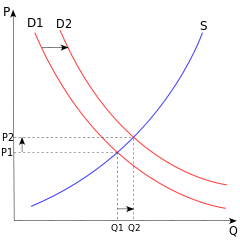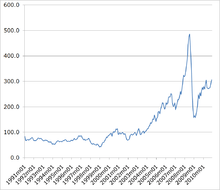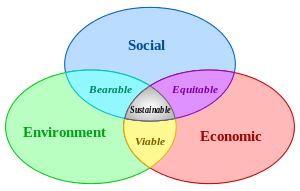Energy economics
| Economics |
|---|
 Supply and Demand graph, illustrating one of the most important economic principles |
|
|
| By application |
|
| Lists |
|
Energy economics is a broad scientific subject area which includes topics related to supply and use of energy in societies.[1] Due to diversity of issues and methods applied and shared with a number of academic disciplines, energy economics does not present itself as a self-contained academic discipline, but it is an applied subdiscipline of economics. From the list of main topics of economics, some relate strongly to energy economics:
- Econometrics
- Environmental economics
- Finance
- Industrial organization
- Microeconomics
- Macroeconomics
- Resource economics
Energy economics also draws heavily on results of energy engineering, geology, political sciences, ecology etc. Recent focus of energy economics includes the following issues:
- Climate change and climate policy
- Risk analysis and security of supply
- Sustainability
- Energy markets and electricity markets - liberalisation, (de- or re-) regulation
- Demand response
- Energy and economic growth
- Economics of energy infrastructure
- Environmental policy
- Energy policy
- Energy derivatives
- Forecasting energy demand
- Elasticity of supply and demand in energy market
- Energy elasticity
Some institutions of higher education (universities) recognise energy economics as a viable career opportunity, offering this as a curriculum. The University of Cambridge, Massachusetts Institute of Technology and the Vrije Universiteit Amsterdam are the top three research universities, and Resources for the Future the top research institute.[2] There are numerous other research departments, companies and professionals offering energy economics studies and consultations.
History

Energy related issues have been actively present in economic literature since the 1973 oil crisis, but have their roots much further back in the history. As early as 1865, W.S. Jevons expressed his concern about the eventual depletion of coal resources in his book The Coal Question.[3][4] One of the best known early attempts to work on the economics of exhaustible resources (incl. fossil fuel) was made by H. Hotelling, who derived a price path for non-renewable resources, known as Hotelling's rule.[5]
Sources, links and portals
Leading journals of energy economics include:
There are several other journals that regularly publish papers in energy economics:
- Energy – The International Journal
- Energy Policy
- International Journal of Global Energy Issues
- Utilities Policy
There is also a handbook in three volumes.
Much progress in energy economics has been made through the conferences of the International Association for Energy Economics, the model comparison exercises of the (Stanford) Energy Modeling Forum and the meetings of the International Energy Workshop.
IDEAS/RePEc has a collection of recent working papers.
Leading Energy Economists
IDEAS/RePEc has a list of energy economists and a ranking of the same. Here are the top 20 leading energy economists:
- Martin L. Weitzman
- Lutz Kilian
- David M Newbery
- Robert S. Pindyck
- Kenneth J. Arrow
- Richard S.J. Tol
- Severin Borenstein
- Mohsen Bahmani-Oskooee
- James Hamilton
- Frederick (Rick) van der Ploeg
- Richard G. Newell
- Jeffrey Alexander Frankel
- Michael Greenstone
- Robert Norman Stavins
- Richard Schmalensee
- Paul Joskow
- Ilhan Ozturk
- Kenneth S Rogoff
- Olivier J Blanchard
- David Ian Stern
Further reading
- How to Measure the True Cost of Fossil Fuels March 30, 2013 Scientific American
- Bhattacharyya, S. (2011). Energy Economics: Concepts, Issues, Markets, and Governance. London: Springer-Verlag limited.
- Herberg, Mikkal (2014). Energy Security and the Asia-Pacific: Course Reader. United States: The National Bureau of Asian Research.
See also
References
- ↑ Sickles, Robin (2008). "energy economics." The New Palgrave Dictionary of Economics, 2nd Edition. Abstract.
- ↑ IDEAS/RePEc
- ↑ Online Library of Liberty - Titles
- ↑ Jevons, The Coal Question: Library of Economics and Liberty
- ↑ Hotelling, H. (1931). "The Economics of Exhaustible Resources". Journal of Political Economy. 39 (2): 137–175. doi:10.1086/254195. JSTOR 1822328.
| Wikimedia Commons has media related to Energy economics. |
